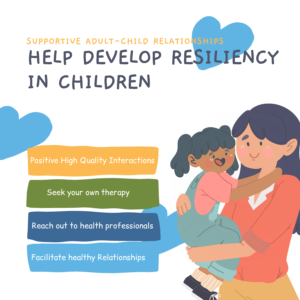 Children who have at least one stable and committed supportive-relationship with a caring adult, have improved resiliency to cope in the midst of adversity, according to studies on relationships and childhood resiliency. One of the benefits is that the power of the relationship can help buffer the negative impacts of toxic-stress, such as chronic exposure to adverse childhood experiences.
Children who have at least one stable and committed supportive-relationship with a caring adult, have improved resiliency to cope in the midst of adversity, according to studies on relationships and childhood resiliency. One of the benefits is that the power of the relationship can help buffer the negative impacts of toxic-stress, such as chronic exposure to adverse childhood experiences.
Exposure to adverse childhood experiences, identified by the CDC.-Kaiser Permanente Adverse Childhood Experiences (ACE) Study, has found that repeated exposure to toxic stress can disrupt the developing brain and have long-term health and mental implications on early development which can last into the adult years. The original ten ACEs identified the following adverse events–abuse: (physical, emotional, sexual), neglect: (physical, and emotional), household dysfunction: mental illness, the mother being treated violently, divorce, incarcerated relative, and substance abuse. Other categories have been since added such as racism, bullying, and community violence.
These events are stressful for anyone, but especially those who are more vulnerable to abuse and neglect. The relationship with one’s parent or primary caregiver is a powerful foundation for early attachment. Feeling physically and emotionally safe, having basic needs met, and feeling loved are so important within all relationships, but especially in the formative years of childhood.
Supportive adult relationships were identified as one of four key-concepts for developing resiliency by The Center for the Developing Child at Harvard University. The other three include self-efficacy and perceived control, adaptive skills, self-regulation, and utilizing faith, hope, and cultural traditions.
Having access to resources, skills, and support helps equip the parent/ caregiver to provide the supportive benefits identified by research. Youth who have at least one supportive adult relationship with their parent/ caregiver tend to have better physical and mental health, improved academic achievement, fewer behavioral problems, lower rates of drinking and drug use, improved feelings about self, and resiliency to cope with stressful or traumatic experiences. These benefits can extend to supportive adult-child relationships with positive role models in the school and community settings.
Ideas to Develop Resiliency Through Adult-Child Relationships
- Focus on strengthening the relationship with your child/ teen and the primary caregiver through positive, high quality parenting interactions. This includes active, empathic-listening, creating time for quality one-on-one-time-with-each-of-your-kids, and removing distractions. Be available to do daily activities such as reading, talking, and eating with your child.
- Consider seeking your own therapy to help model healthy ways to cope with emotions, dysfunctional-family dynamics, and stressful circumstances. Do relationship-repair work to help strengthen relationships with a partner(s) such as seeking individual and/ or couples therapy. Group supports for mental health and parenting such as nami-minnesota-support-groups are also great options.
- If you are struggling with parenting due to emotional and behavioral concerns in your child/ teen, please reach out to a medical or mental health professional. They can help assess the presenting concerns, develop a treatment plan, and assist with connections to additional resources. Cultural, religious, and spiritual support can also be very helpful. Show your unconditional-love during times of joy and challenge.
- Help facilitate healthy relationships with trusted adult figures such as youth leaders, coaches, teachers, or mentors. Educational and after-school enrichment options offer opportunities to learn valuable skills and develop relationships with adults within the community.
- Encourage your child to contribute their strengths in meaningful ways to foster a sense of connection and belonging. This may include activities such as work-study options, volunteering, or joining a group that provides a safe space, such as youth-organizations for LGBTQ youth.
- Take the time to notice, praise, and encourage youth. “No act of kindness no matter how small is ever wasted.”-Aesop
We’re Here to help
Our wellness experts will be happy to take care of you. You can CLICK HERE to schedule an appointment now or call (612)223-8898.
Meet Clinicians
We’re united by our commitment to providing effective, relevant, and innovative mental health support at all stages of your journey. Click Here to find a therapist or find out more about who we are, where we come from, and how we live out CARE’s mission every day.
The professionals at CARE are actively collecting and creating resources to help with what you need and address frequently asked questions. We’re Here for You.



